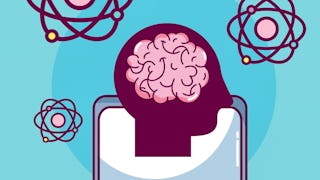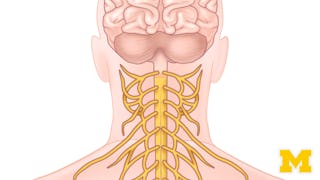- Browse
- Neuroscience
Neuroscience Courses
Neuroscience courses can help you learn brain anatomy, neural signaling, cognitive functions, and the biological basis of behavior. You can build skills in experimental design, data analysis, and critical thinking through hands-on projects and case studies. Many courses introduce tools like EEG, fMRI, and software for statistical analysis, that support conducting research and interpreting findings in both clinical and experimental settings.
Popular Neuroscience Courses and Certifications
 Status: PreviewPreviewT
Status: PreviewPreviewTThe University of Chicago
Skills you'll gain: Neurology, Physiology, Anatomy, Behavioral Health, Mental and Behavioral Health, Mental Health Diseases and Disorders, Vital Signs, Control Systems, Coordination, Biology, Communication Systems
4.9·Rating, 4.9 out of 5 stars3.2K reviewsBeginner · Course · 1 - 3 Months
 Status: PreviewPreviewD
Status: PreviewPreviewDDuke University
Skills you'll gain: Neurology, Physiology, Anatomy, Cell Biology, Psychology, Pathology, Molecular Biology
4.9·Rating, 4.9 out of 5 stars3.1K reviewsAdvanced · Course · 3 - 6 Months
 Status: Free TrialFree TrialJ
Status: Free TrialFree TrialJJohns Hopkins University
Skills you'll gain: Marketing Psychology, Influencing, Case Studies, Persuasive Communication, Advertising, Marketing Communications, Consumer Behaviour, Decision Making, Marketing Effectiveness, Neurology, Behavioral Economics, Marketing, Psychology, Anatomy
4.6·Rating, 4.6 out of 5 stars36 reviewsIntermediate · Course · 1 - 3 Months
 Status: Free TrialFree TrialJ
Status: Free TrialFree TrialJJohns Hopkins University
Skills you'll gain: Magnetic Resonance Imaging, Neurology, Medical Imaging, Diagnostic Radiology, Anatomy, Radiology, X-Ray Computed Tomography, Experimentation, Research Design, Biomedical Technology, Image Analysis, Physiology, Medical Terminology
4.7·Rating, 4.7 out of 5 stars2.3K reviewsBeginner · Course · 1 - 4 Weeks
 Status: Free TrialFree TrialU
Status: Free TrialFree TrialUUniversity of Michigan
Skills you'll gain: Anatomy, Neurology, Physiology, Medical Terminology
4.9·Rating, 4.9 out of 5 stars1K reviewsBeginner · Course · 1 - 3 Months
 Status: PreviewPreviewU
Status: PreviewPreviewUUniversity of Washington
Skills you'll gain: Supervised Learning, Network Model, Matlab, Machine Learning Algorithms, Artificial Neural Networks, Neurology, Computer Science, Reinforcement Learning, Computational Thinking, Bioinformatics, Mathematical Modeling, Physiology, Recurrent Neural Networks (RNNs), Biology, Linear Algebra, Statistical Methods, Information Architecture, Differential Equations, Probability Distribution
4.6·Rating, 4.6 out of 5 stars1.1K reviewsBeginner · Course · 1 - 3 Months
What brings you to Coursera today?
 Status: Free TrialFree TrialU
Status: Free TrialFree TrialUUniversity of Cambridge
Skills you'll gain: Human Learning, Child Development, Psychology, Empathy & Emotional Intelligence, Teaching, Decision Making, Learning Theory, Instructional Strategies, Pedagogy, Learning Strategies, Developmental Disabilities, Empathy, Working With Children, Neurology, Magnetic Resonance Imaging, Disabilities, Autism Spectrum Disorders, Medical Imaging, Electrophysiology, Human Development
4.6·Rating, 4.6 out of 5 stars121 reviewsBeginner · Specialization · 3 - 6 Months
 Status: Free TrialFree TrialJ
Status: Free TrialFree TrialJJohns Hopkins University
Skills you'll gain: Magnetic Resonance Imaging, Neurology, Medical Imaging, Diagnostic Radiology, Anatomy, Image Analysis, Data Analysis, X-Ray Computed Tomography, Data Manipulation, Radiology, Analytical Skills, Experimentation, Statistical Analysis, Biomedical Technology, Advanced Analytics, Network Analysis, R Programming, Data Processing, Research Design, Statistics
4.6·Rating, 4.6 out of 5 stars3.3K reviewsIntermediate · Specialization · 3 - 6 Months
 Status: Free TrialFree TrialU
Status: Free TrialFree TrialUUniversity of Cambridge
Skills you'll gain: Human Learning, Psychology, Magnetic Resonance Imaging, Medical Imaging, Neurology, Research Methodologies, Research, Human Development, Learning Theory, Scientific Methods, Child Development
4.8·Rating, 4.8 out of 5 stars70 reviewsMixed · Course · 1 - 3 Months
 Status: Free TrialFree TrialU
Status: Free TrialFree TrialUUniversity of Colorado Boulder
Skills you'll gain: Organizational Leadership, Team Motivation, Diversity and Inclusion, Innovation, Team Leadership, Initiative and Leadership, Personal Development, Leadership, Resilience, Team Management, Team Performance Management, Industrial and Organizational Psychology, Business Leadership, Leadership and Management, Decision Making, Self-Awareness, Coaching, Change Management, Psychology, Storytelling
Build toward a degree
4.8·Rating, 4.8 out of 5 stars154 reviewsBeginner · Specialization · 3 - 6 Months
 Status: PreviewPreviewY
Status: PreviewPreviewYYale University
Skills you'll gain: Psychology, Child Development, Psychiatry, Mental Health, Human Development, Human Learning, Social Sciences, Behavioral Health, Sociology, Neurology, Critical Thinking, Scientific Methods, Problem Solving
4.9·Rating, 4.9 out of 5 stars32K reviewsBeginner · Course · 1 - 3 Months
 Status: FreeFreeU
Status: FreeFreeUUtrecht University
Skills you'll gain: Child Development, Human Development, Empathy & Emotional Intelligence, Speech Language Pathology, Systems Thinking, Pediatrics, Research, Neurology, Cultural Diversity
4.7·Rating, 4.7 out of 5 stars474 reviewsBeginner · Course · 1 - 3 Months
What brings you to Coursera today?
In summary, here are 10 of our most popular neuroscience courses
- Understanding the Brain: The Neurobiology of Everyday Life: The University of Chicago
- Medical Neuroscience: Duke University
- Foundations of Neuroscience: Johns Hopkins University
- Fundamental Neuroscience for Neuroimaging: Johns Hopkins University
- Anatomy: Human Neuroanatomy: University of Michigan
- Computational Neuroscience: University of Washington
- The science of mind and decision making: University of Cambridge
- Neuroscience and Neuroimaging: Johns Hopkins University
- Introduction to Cognitive Psychology and Neuropsychology: University of Cambridge
- Neuroscience of Leadership: Leading with Your Brain: University of Colorado Boulder
Frequently Asked Questions about Neuroscience
Neuroscience is the scientific study of the nervous system, encompassing the brain, spinal cord, and networks of neurons. It is crucial because it helps us understand how our brains function, influencing behavior, cognition, and emotions. This knowledge is vital for advancing medical treatments, improving mental health, and enhancing learning processes. By exploring neuroscience, we can better comprehend the complexities of human behavior and develop strategies to address neurological disorders.
Careers in neuroscience are diverse and can lead to various roles in research, healthcare, education, and industry. Some potential job titles include neuroscientist, clinical psychologist, neuropsychologist, research assistant, and medical science liaison. Additionally, roles in pharmaceuticals, biotechnology, and academic institutions are common. These positions often involve conducting experiments, analyzing data, and applying neuroscience principles to real-world problems.
To pursue a career in neuroscience, you should develop a strong foundation in biology, chemistry, and psychology. Key skills include critical thinking, data analysis, and proficiency in research methodologies. Familiarity with neuroimaging techniques and statistical software can also be beneficial. Additionally, soft skills such as communication and teamwork are essential, as neuroscience often involves collaboration across disciplines.
There are several excellent online neuroscience courses available that cater to various interests and skill levels. For instance, the Foundations of Neuroscience course provides a comprehensive introduction to the field. For those interested in the intersection of neuroscience and leadership, the Neuroscience of Leadership: Leading with Your Brain Specialization offers valuable insights. Additionally, the Computational Neuroscience course explores the computational models that help us understand brain functions.
Yes. You can start learning neuroscience on Coursera for free in two ways:
- Preview the first module of many neuroscience courses at no cost. This includes video lessons, readings, graded assignments, and Coursera Coach (where available).
- Start a 7-day free trial for Specializations or Coursera Plus. This gives you full access to all course content across eligible programs within the timeframe of your trial.
If you want to keep learning, earn a certificate in neuroscience, or unlock full course access after the preview or trial, you can upgrade or apply for financial aid.
To learn neuroscience effectively, start by identifying your specific interests within the field. Enroll in foundational courses to build your knowledge base, and gradually explore specialized topics. Engage with interactive content, participate in discussions, and apply what you learn through practical exercises. Consistent study and practice will reinforce your understanding and help you stay motivated.
Typical topics covered in neuroscience courses include brain anatomy, neural communication, sensory systems, cognitive processes, and neuroplasticity. Courses may also explore the biological basis of behavior, the impact of neurotransmitters, and the effects of various disorders on brain function. Understanding these concepts is essential for anyone looking to work in the field of neuroscience.
For training and upskilling employees in neuroscience, courses like the Neuroscience of Leadership: Leading with Your Brain Specialization and The Neuroscience of Leading High-Performance Teams are particularly beneficial. These programs focus on applying neuroscience principles to enhance leadership skills and team dynamics, making them valuable for organizations looking to improve performance and collaboration.










